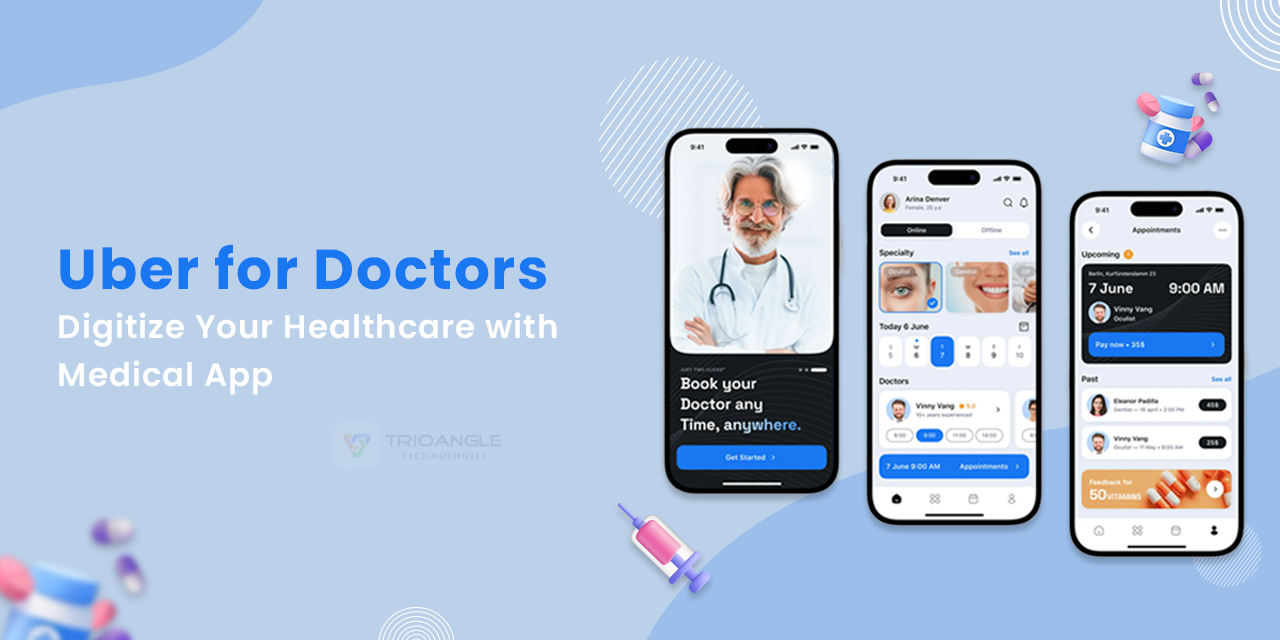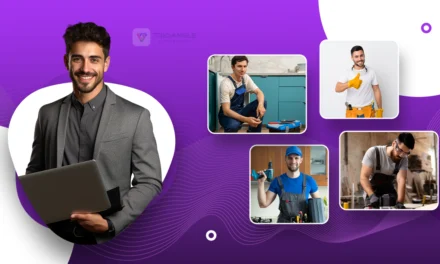“Uber for doctors – a revolutionary medical app development solution”
In today’s fast-paced world, people seek instant solutions for their needs—whether it’s food, transport, or shopping. The healthcare industry is no exception.
The Uber for doctors concept is revolutionizing the medical sector by offering on-demand healthcare services, allowing patients to connect with physicians instantly through a doctor-on-call app.
With the growing need for telemedicine platforms, many startups and businesses are investing in on-demand doctor apps to bridge the gap between patients and healthcare providers.
But what exactly is an Uber-like app for doctors, and how does it benefit both patients and practitioners?
Let’s explore.
What is Uber for Doctors?
Uber for doctors is an on-demand medical consultation app that connects patients with certified doctors, allowing them to book appointments, request urgent care services, or opt for virtual consultations.
Just like Uber connects riders with drivers, an Uber-inspired healthcare app allows patients to access medical professionals at their convenience.
This innovative model eliminates long waiting hours, making instant medical assistance accessible. Whether a patient needs a home visit doctor, telehealth services, or a primary care physician on demand, this app ensures seamless healthcare access with just a few taps.
Are you looking to develop a doctor appointment app?
Get Free Demo – WhatsApp | E-Mail | Telegram
How Does an Uber for Doctor App Work?
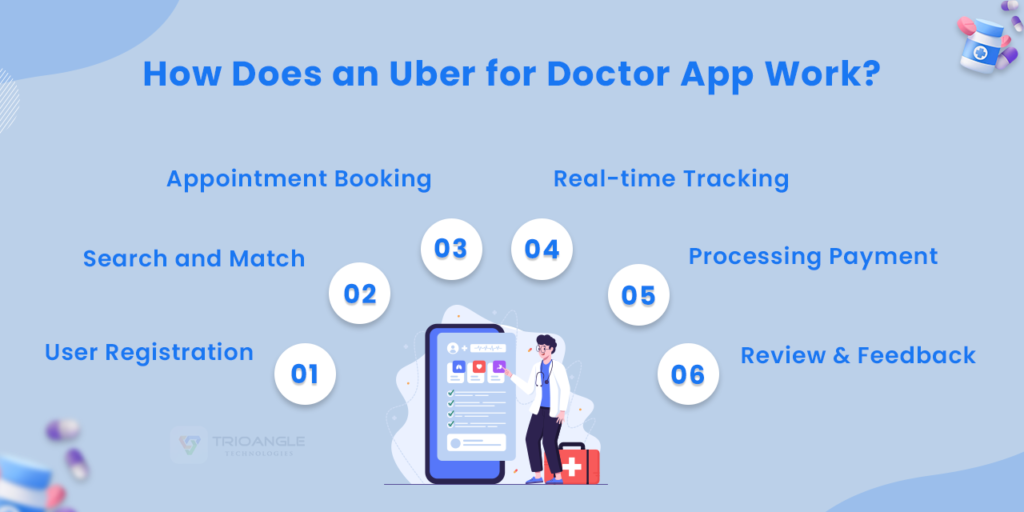
An Uber-style medical app operates through a simple and intuitive process:
User Registration – Patients sign up using their mobile number, email, or social media.
Search and Match – Users browse available doctors based on specialization, location, and ratings.
Appointment Booking – Patients schedule an in-person consultation or video call consultation.
Real-time Tracking – For home visits, users can track the doctor’s arrival in real time.
Processing Payment – The app integrates multiple payment gateways for hassle-free transactions.
Review & Feedback – Patients can rate their experience and provide feedback.
This simplified workflow enables users to easily navigate through the app, book appointments, and consult doctors instantly.
In the next section, let’s take a look at the features.
Features of an Uber-like Doctor App
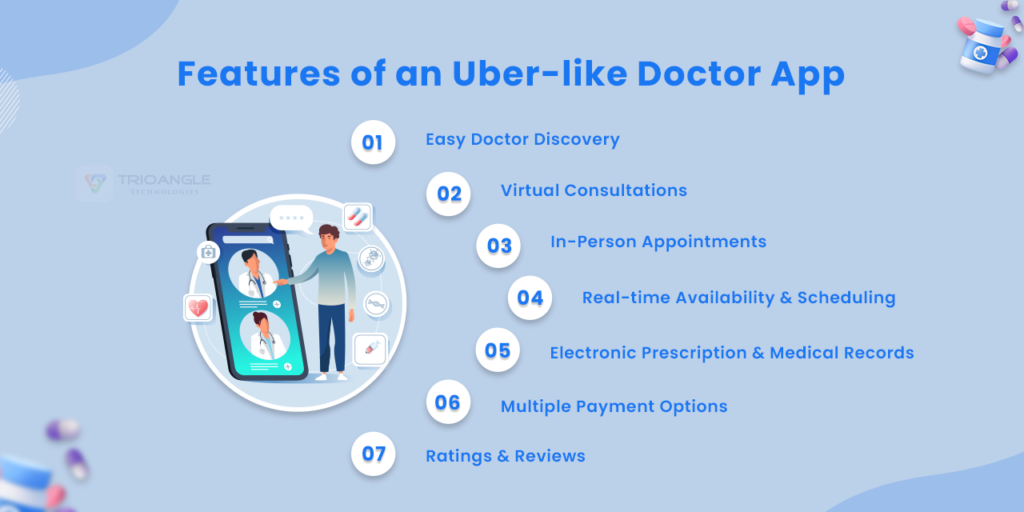
To develop a successful Uber for medical professionals, integrating key features is essential:
1. Easy Doctor Discovery
Patients should be able to search for general physicians, specialists, or emergency doctors based on filters like availability, experience, and reviews.
2. Virtual Consultations
Telemedicine integration allows patients to consult doctors via video calls, ensuring quick diagnosis and treatment plans.
3. In-Person Appointments
For patients preferring in-person medical services, the app facilitates doctors who are open to providing healthcare at patients’ homes.
4. Real-time Availability & Scheduling
Patients can see doctor availability in real time to book appointments instantly.
5. Electronic Prescription & Medical Records
E-prescriptions and digital medical records enhance patient convenience and improve continuity of care.
6. Multiple Payment Options
Secure payment methods, including credit/debit cards and wallets, are supported by Uber for doctor app.
7. Ratings & Reviews
Patients can provide ratings and feedback regarding the service which helps to improve service quality and boosts trust within the platform.
Benefits of Uber for Doctor App
Let’s explore the advantages of an on-demand healthcare app for both patients and doctors separately:
For Patients:
Instant Medical Access – No more waiting in long queues; consult a doctor at your convenience.
Cost-effective Healthcare – Reduced consultation fees compared to hospital visits.
Convenience & Flexibility – Access healthcare from anywhere, anytime.
Better Health Monitoring – Patients can track medical history and get follow-up care easily.
For Doctors:
Increased Patient Base – Reach a wider audience beyond local clinics.
Flexible Work Hours – Physicians can set their availability and work as per their schedule.
Higher Revenue Potential – Direct consultations help doctors maximize earnings.
Improved Patient Engagement – Efficient appointment scheduling and digital records enhance patient relationships.
By providing these benefits, you can encourage more users to consult doctors and order medication through your app.
Monetization Models for an Uber for Doctor App
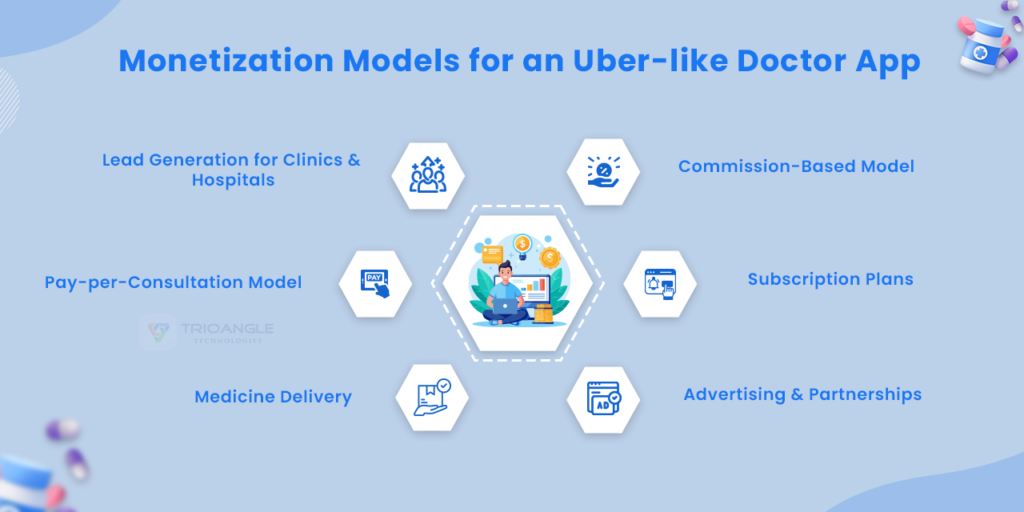
If you’re an entrepreneur looking to develop a doctor appointment booking app, here are a few revenue models to consider:
1. Commission-Based Model
Charge doctors a commission for every patient they consult via the app.
2. Subscription Plans
Offer premium benefits for patients, giving them priority access, discounted rates, and additional features.
3. Advertising & Partnerships
Generate revenue by collaborating with pharmacies, diagnostic centers, and medical equipment providers.
4. Lead Generation for Clinics & Hospitals
Charge clinics a fee for referring patients who need specialized treatments or hospital care.
5. Pay-per-Consultation Model
Patients pay a fixed fee per consultation, and a portion goes to the platform.
6. Medicine Delivery
In addition to online consultation, users may look for options to purchase medicine on your platform. You can deliver medication also and yield an additional stream of income by charging delivery fees.
Next up – challenges in developing an on-demand medical care app and exploring the practical solutions to overcome them.
Challenges & Solutions in Developing an Uber for Doctor App
1. Regulatory Compliance
🤔 Problem: Telemedicine platforms handle sensitive patient information, which is subject to strict regulations like HIPAA, GDPR, and other local medical licensing laws. Non-compliance can lead to legal issues, fines, or even shutdowns.
😌 Solution: Make sure your Uber for doctors platform strictly adheres to healthcare data regulations. Implement necessary compliance frameworks and obtain required certifications before getting started.
2. Doctor Availability
🤔 Problem: Patients seeking online consultations often face long wait times. Or the unavailability of doctors especially during emergencies or odd hours. This can lead to service dissatisfaction and even loss of trust in the platform.
😌 Solution: Partner with a diverse network of medical professionals, including general practitioners and specialists, to ensure 24/7 availability for consultations. When launching your platform, it should have a number of doctors ready to offer medical care.
3. Sensitive Data Protection
🤔 Problem: Online healthcare services involve storing and transmitting confidential medical records. This makes them a target for cyber threats and data breaches. Unauthorized access to this confidential data can cause serious consequences for patients and your healthcare services.
😌 Solution: To safeguard sensitive data, adhere to the following security measures:
- Encrypt all communications between patients and doctors.
- To keep logins secure, implement multi-factor authentication (MFA), e.g., password + OTP or biometric verification.
- Restrict data access based on user roles with role-based access control (RBAC).
- Store patient data in HIPAA/GDPR-compliant cloud servers.
- Conduct routine vulnerability assessments to identify and fix security loopholes.
- If possible, use blockchain technology to ensure tamper-proof medical records.
- Automate frequent encrypted data backups to prevent data loss.
4. Building Trust Among Patients
🤔 Problem: Patients may initially hesitate to use your telemedicine platforms due to a lack of knowledge about consulting doctors online. Without proper verification, they might doubt the legitimacy of medical professionals.
😌 Solution: Establish transparency and build trust by displaying verified doctor credentials, service ratings, and patient reviews, and provide customer support 24/7 to address any issues immediately.
By addressing these challenges tactically with these well-defined solutions, you can make your Uber for doctors more meaningful.
What’s the Future of On-Demand Doctor Services?
The need for on-demand medical apps is rapidly increasing in today’s smartphone age.
According to ScienceDirect’s prediction, global telemedicine revenues are estimated to reach US$460 billion by 2030.
This growth is going to be primarily fueled by:
- Advancements in AI-driven diagnostics
- Remote patient monitoring
- Wearable health technology
This shows the digital healthcare market is ripe for new entrants; so you should not miss out on this great opportunity.
Conclusion
Uber for doctors app is a game-changer solution in modern healthcare, offering patients quick, affordable, and convenient access to medical professionals.
As more investors show interest in investing in on-demand healthcare apps, this industry presents lucrative opportunities for startups and healthcare providers.
Whether you’re an entrepreneur looking to develop a doctor appointment app or a healthcare provider aiming to expand your reach, now is the perfect time to tap into the future of digital healthcare.
Are you ready to build your own Uber-like healthcare app?

